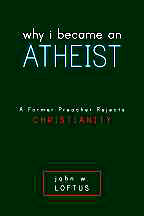John W. Loftus
John W. Loftus is a philosopher and counter-apologist who earned M.A. and M.Div. degrees in theology and philosophy from Lincoln Christian Seminary. He then attended Trinity Evangelical Divinity School, where he studied under William Lane Craig, earning a Th.M. degree in philosophy of religion. John also studied in a Ph.D. program at Marquette University.
Before leaving the church, he had ministries in Michigan, Illinois, and Indiana, and taught at several Christian and secular colleges.
He's the author/editor of thirteen critically acclaimed books, including Why I Became an Atheist, The Outsider Test for Faith, Unapologetic, How to Defend the Christian Faith, The Christian Delusion, Christianity is Not Great, Christianity in the Light of Science, The Case against Miracles, and God and Horrendous Suffering.
He has an online blog at debunkingchristianity.blogspot.com.
Published on the Secular Web
Hail Mary: Was Virgin Mary Truly the Mother of God’s Son?
Questioning Miracles: In Defense of David Hume
Why I Am Not a Christian: A Summary of My Case Against Christianity
McIntosh and Horrendous Suffering
God and Horrendous Suffering
The Loftus-McIntosh Debate [Index]
Does God Exist? A Definitive Biblical Case
In this essay atheist John Loftus argues that there is a better approach, one that changed his own mind back when he was a Christian apologist himself. This (shockingly novel) approach involves simply taking the Bible seriously. When we take the Bible at its word, we find that the Judeo-Christian God had a complex evolution over the centuries from Elohim, to Yahweh, to Jesus, and then finally to the god of the philosophers, without the original gods having been credited with any merit.





